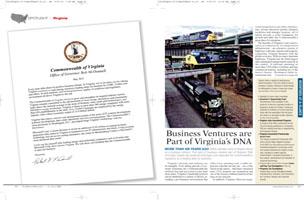
 More than 400 years ago, British colonists came to Virginia shores as a business venture. That spirit of business remains part of Virginia’s DNA, and today, Virginia has preserved that legacy and expanded the Commonwealth’s reputation as a leading state for business.
More than 400 years ago, British colonists came to Virginia shores as a business venture. That spirit of business remains part of Virginia’s DNA, and today, Virginia has preserved that legacy and expanded the Commonwealth’s reputation as a leading state for business.
Virginia’s diversity and resiliency are its strengths. Even during periods of economic downturn, the Commonwealth has suffered less and recovered sooner than most states. Virginia’s leadership position can be attributed to a variety of factors, including a pro-business environment that offers lower operating costs, a stable six-percent corporate income tax—one of the lowest in the nation—that hasn’t increased since 1972, property tax exemptions and one of the lowest combined state/local/use taxes at five percent.
In addition, Virginia offers an exceptional transportation and utility infrastructure, strong education system, dynamic workforce and strategic location—all of which provide a solid foundation for growth and make the Commonwealth a great place for enterprise.
The benefits of Virginia’s east coast location are balanced by its transportation infrastructure—an extensive system of highways, railroads, airports and seaports, connecting Virginia business with the global economy. With six major interstate highways, Virginia has the third-largest state- maintained transportation network in the country, 14 railroads operating on more than 3,500 miles of railway and nine commercial airports, including two of the nation’s busiest—Washington Dulles International and Ronald Reagan Washington National. Virginia has the largest port complex in the United States, making importing and exporting to the world both efficient and productive.
Green Initiatives
The Commonwealth recently endorsed the Clean Energy Manufacturing Incentive Grant. The program is designed to provide financial incentives to companies that manufacture or assemble equipment, systems or products used to produce renewable or nuclear energy or products used for energy conservation, storage or grid efficiency purposes.
While advanced manufacturing remains a solid component of the Virginia economy, energy and information technology are strong and growing business clusters in which the Commonwealth possesses unique advantages.
Virginia is committed to the advancement of clean energy alternatives, consistently ranking above the national average in the areas of biomass, smart grid technologies and alternative energy production.
 Wind Energy Potential
Wind Energy Potential
The Commonwealth’s greatest potential lies in wind energy. Virginia has identified 25 sites suitable for off-shore wind energy production. These sites have minimal conflict and are at least 12 miles off the shore with water depths under 100 feet. The shallow water depths provide an advantage in lowering the installation and submarine cabling costs of effective offshore wind turbine deployment.
Education and Energy
Collaborating with the state on alternative energy initiatives are Virginia’s colleges and universities. Virginia is among the most educated states in the country, issuing nearly 83,000 associate, bachelor, master and doctoral degrees at its public and private institutions last year. More than 500,000 students are enrolled in more than 90 in-state institutions of higher education. Virginia’s education system also hosts 23 community colleges with transferrable programs across the state. As a result, Virginia’s higher education system is the eleventh-largest in the nation. This tradition of lifelong education means Virginia’s workforce is consistently prepared for changing technologies and delivers a pipeline of skilled applicants for companies today and for years to come.
At least two Virginia universities are working on research and development initiatives for each type of alternative energy source at any given time. Approximately 90 percent of Virginia universities are conducting research on nuclear, H2 (fuel cells), solar and wind energy sources.
In addition to university research, Virginia is home to the Thomas Jefferson National Accelerator Facility, a nationally known center for physics R & D, and the NASA Langley Research Center.
Virginia has announced eight new or expanding businesses in energy: Fortistar; Lawyers Road Energy LLC; United States Green Energy; Applied Process Technology International LLC; Consolidated Glass & Mirror Corporation; Evatran; and Wood Fuel Developers. Virginia is home to more than 380 energy companies with more than 630 establishments in the state. More than 32,000 Virginians are employed by the energy industry with a direct economic output of 15.4 billion dollars; and the annual labor force growth includes over 18,000 skilled workers exiting the military annually.
Virginia also enjoys national and international acclaim in the areas of IT systems development, software development, data center operations and telecommunications. The Commonwealth’s close proximity to Washington, D.C., has helped forge Virginia’s technology industry dominance.
 Data Centers
Data Centers
The Commonwealth has focused its efforts on growing its data center industry. Assets such as low environmental/disaster risk and growth of existing clusters of data center facilities in varied regions around the state make Virginia a natural choice. In addition to continuing to develop partnerships with communities, utilities, higher education and other partners to meet the industry’s ever-evolving needs, Virginia has identified more than 130 sites and buildings that are prequalified for data center activity. Prequalification characteristics include:
• 10+-acre sites
• Locations within one mile of electrical transmission and fiber lines
• 5-30 megawatts of power capacity
• Redundant fiber availability
• Locations served by a public water/sewer provider.
Virginia also boasts one of the nation’s most competitive sales and use tax exemption policies. For projects that qualify, servers, routers, chillers, generators and enabling software are eligible for sales-tax exempt status.
Basic infrastructure assets for the IT sector are also a strong attribute for Virginia: more than half of the world’s daily Internet traffic flows through the Commonwealth; communications infrastructure has the capacity, security and quality to meet industry needs through partners such as Mid-Atlantic Broadband; and Virginia has the eighth-lowest electricity cost in the nation, with multiple energy providers that can guarantee abundant, quality power. The Commonwealth is home to a vast supply of potable and reclaimed water, and diverse fuel sources, including nuclear, wind, hydro, gas and coal.
IT
Virginia’s higher education community has established significant IT research centers and other assets to focus on the training of students and the delivery of research to industry, and 11 federally funded research and development centers, the Department of Homeland Security (DHS) and the Department of Defense (DoD) play a dynamic and vital role in Virginia.
Just ask Microsoft Corp. about Virginia’s IT infrastructure and assets. In August 2010, Governor Bob McDonnell announced that the company planned to invest up to $499 million to locate its latest-generation data center (Gen4) in Mecklenburg County. Using modular technology and advanced cooling mechanics, the center is Microsoft’s most advanced data center.
The company is expanding in Virginia again. Microsoft will invest another $150 million to build an additional facility and add 21 MW of electric power capacity to the site. The project will create 10 new jobs in addition to the 50 created in 2010.
With its rich diversity, Virginia has a compelling story to tell. The Commonwealth continues to pioneer innovation, bolstering economic development approaches for the 21st century.

